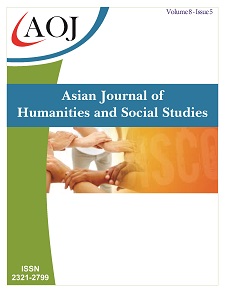The Management of Local Wisdom Tourism of Baduy Tribe by Department of Tourism of Lebak Regency, Banten, Indonesia in Increasing the Number of Tourists
DOI:
https://doi.org/10.24203/ajhss.v8i5.6321Keywords:
Tourism management; Tourism promotion; Local wisdom; Baduy TribeAbstract
The Baduy Village is one of the tourist destinations located in Lebak Regency, Banten, Indonesia. The Department of Tourism of Lebak Regency manages the tourism potential of the Baduy tribe which is loaded with the local wisdom besides its natural beauty.This study aimed to analyze the management of local wisdom tourism of Baduy tribe by the Department of Tourism of Lebak Regency Banten, Indonesia in increasing the number of tourists.
A constructivist paradigm with a case study method was used in this study. The informants were from the Department of Tourism of Lebak Regency and tourists who have been to the Baduy Village. The data collection was done through structured interviews, observations and literature studies. The qualitative data analysis technique was carried out to reveal the tourism management. The research results showed that the tourism management through promotion strategies used segmentation, targetting, and positioning approaches based on geographic, psychographic, and demographic. It also used the promotional mediaReferences
• Ariani, Afrilia Christina and Novi Erlita. 2019. The Public Relations Activities of Taman Impian Jaya Ancol, Ldt in Promoting Jakarta Tourist Attraction. Saudi Journal of Humanities and Social Sciences, Vol 4, Issue 11, pp.2
• Beirman, D. 2003. Restoring tourism destinations in crisis: A strategic marketing approach. Oxford: Oxford University Press
• Briandana, Rizki., Caturida, M.D., and Danto, S. 2018. Promotion Analysis of Marine Tourism in Indonesia: A Case Study. European Research Studies Journal Volume XXI, Issue 1, pp. 604
• Dinas Pariwisata Provisnsi Banten. Profile Provinsi Banten. Internet: https://dispar.bantenprov.go.id/Profil/topic/50 date accessed August 20, 2019
• Gioia, D.A., Corley, K.G. and Hamilton, A.L. 2013. Seeking qualitative rigor in inductive research: Notes on the Gioia methodology. Organizational Research Methods, Vol 16, Issue 1, pp 15-31.
• Goeldner, C.R. and Ritchie, J.R.B. 2012. Tourism: principles, practices, philosophies. John Wiley and Sons, Inc
• Jamal, T.B. and Getz, D. 1995. Collaboration theory and community tourism planning. Annals of tourism research, volume 22, Issue 1, pp. 186-204
• Kennedy, Jhon E. and R. Dermawan. 2006. Marketing & Communication: Taktik & Strategi. Jakarta: PT. Buana Ilmu Populer
• Kotler, P. and Gertner, D. 2002. Country as brand, product, and beyond: A place marketing and brand management perspective. Journal of brand management, volume 9 issue 4, pp. 249-261
• Kotler, P. and K.L.Keller. 2009. Marketing Management, 13th Ed, NJ: Pearson Education, Inc, Upper Saddle River
• Kotler, Philip and Kevin Lane Keller. 2006. Marketing Management, 12th Edition. California: Prentice Hall
• Manahati Zebua, Pemasaran. 2006. Pariwisata: Menuju Festival Sail Daerah. Yogyakarta: Deepublish
• Mangold, W.G. and Faulds, D.J. 2009. Social Media: The New Hybrid Element of The Promotion Mix. Business horizons, volume 52., issue (4), pp. 357-365
• Nirwana. 2004. Prinsip-prinsip Pemasaran Jasa. Malang: DIOMA
• Rowley, J. 1998. Promotion and marketing communications in the information marketplace. Library review, volume, 47., issue 8, pp. 383-387
• Sangaji, Etta Mamang. 2013. Perilaku Konsumen Pendekatan Praktis Disertasi Himpunan Jurnal Penelitian. Yogyakarta: Andi Offset
• Shimp, Terence A. 2000. Periklanan Promosi Aspek Tambahan Komunikasi Pemasaran Terpadu. Jakarta: Erlangga
• Suryadana, M. Liga and Vanny Octavia. 2015. Pengantar Pemasaran Pariwisata. Bandung: Alfabet
• Suwantoro, Gamal. 2004. Dasar-dasar Pariwisata, Yogyakarta: Andi Offset
• Suwena, I Gusti and I Gusti Ngurah Widyatmaja. 2017. Pengetahuan Dasar Ilmu Pariwisata. Denpasar: Pustaka Larasan
• Synodinos, N.E. 1990. Environmental attitudes and knowledge: A comparison of marketing and business students with other groups. Journal of Business Research, volume 20 issue 2, pp.161-170
• Yin, Robert K. 2008. Studi Kasus (Desain Dan Metode) (Case Study Research Design and Methods). Jakarta: PT.Raja Grafindo Persada
Downloads
Published
Issue
Section
License
Copyright (c) 2020 Farid Hamid Umarella , Dewi Sad Tanty, Aprezia Anjanie

This work is licensed under a Creative Commons Attribution-NonCommercial 4.0 International License.
- Papers must be submitted on the understanding that they have not been published elsewhere (except in the form of an abstract or as part of a published lecture, review, or thesis) and are not currently under consideration by another journal published by any other publisher.
- It is also the authors responsibility to ensure that the articles emanating from a particular source are submitted with the necessary approval.
- The authors warrant that the paper is original and that he/she is the author of the paper, except for material that is clearly identified as to its original source, with permission notices from the copyright owners where required.
- The authors ensure that all the references carefully and they are accurate in the text as well as in the list of references (and vice versa).
- Authors retain copyright and grant the journal right of first publication with the work simultaneously licensed under a Attribution-NonCommercial 4.0 International that allows others to share the work with an acknowledgement of the work's authorship and initial publication in this journal.
- Authors are able to enter into separate, additional contractual arrangements for the non-exclusive distribution of the journal's published version of the work (e.g., post it to an institutional repository or publish it in a book), with an acknowledgement of its initial publication in this journal.
- Authors are permitted and encouraged to post their work online (e.g., in institutional repositories or on their website) prior to and during the submission process, as it can lead to productive exchanges, as well as earlier and greater citation of published work (See The Effect of Open Access).
- The journal/publisher is not responsible for subsequent uses of the work. It is the author's responsibility to bring an infringement action if so desired by the author.


